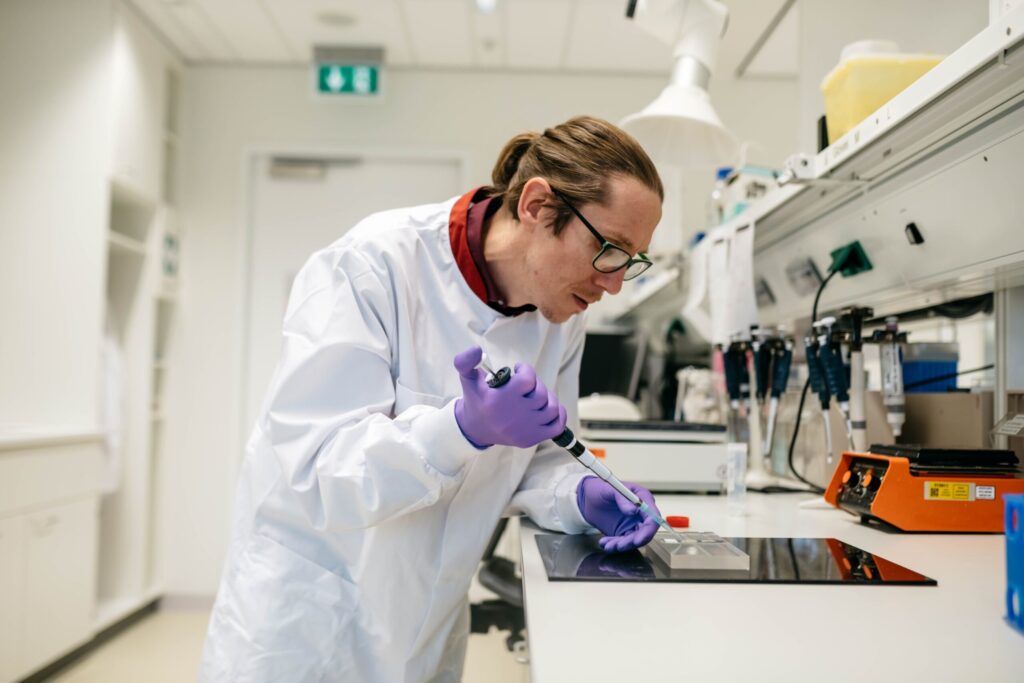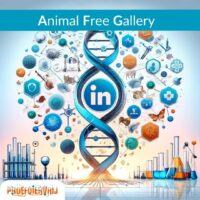Welcome to Drijfveren. Here, researchers tell people what motivates them to work towards an animal-free future. This time, the spotlight is on neuroscientist Antonio Luchicchi. Using human material, Antonio conducts animal-free research into multiple sclerosis (MS) at the MS Center Amsterdam.”
Pictures by Michiel Stock for Nationaal MS Fonds

More than 25,000 people live with MS in the Netherlands. Research is urgently needed, but it is still too often done on mice and rats. “We have to artificially induce MS in these animals, but in humans it occurs naturally,” Antonio explains. “And that’s precisely what we want to study: how does MS develop? That’s our main reason for doing animal-free research.”
From the clinic to the lab
Antonio began his career as a clinical psychologist. “But I felt that during my studies, I hadn’t learned enough about how the human brain works. So, I decided to take an internship in neuroscience at a laboratory.”
During this internship, Antonio discovered how much he enjoyed neuroscience. Working in a laboratory suited him much better than working in a clinic. “I decided to pursue a PhD in neuroscience. Unfortunately, in the early 2010s, alternatives to animal testing were scarce, so I had to work with laboratory animals to get my PhD.”
Research on real brains
Fortunately, things changed quickly. After completing his PhD, Antonio met Prof. Dr. Jeroen Geurts, who wanted to start a study into the causes of multiple sclerosis (MS). Antonio didn’t hesitate to join him.
As a result, Antonio now works as an assistant professor at Amsterdam UMC, conducting research on MS using human material. “When a donor passes away, the brain is donated to science through a program run by the Netherlands Brain Bank,” Antonio explains. “This allows us to conduct research on material from real people who had MS during their lives. For a condition like MS, which does not naturally occur in animals, this is certainly more relevant than experiments on animals.”

Antonio Luchicchi by Michiel Stock for Nationaal MS Fonds
Role of the immune system
MS has always been seen as an autoimmune disease, but Antonio believes this view might be about to change. “Recently, it was discovered that the brains of MS patients showed more microscopic changes in myelin* than the brains of patients with other brain disorders,” Antonio says. “We are now investigating whether the loss of myelin is caused by an abnormal process in the brain. If so, the immune system might play a secondary role rather than a primary one in the development of MS.”
In the new phase of the research, which is partially funded by us, Antonio and his team are now investigating how myelin blisters develop. “We do this by adding different substances to the brain model. Once we understand how myelin blisters form, we can develop ways to prevent them and perhaps even repair them eventually.”
*Myelin is a white, fatty substance that coats the nerve fibers. These fibers are responsible for transmitting signals between nerve cells, but due to the blisters, myelin is lost.
Daring to do animal-free research
Animal testing has been done for thousands of years. Therefore, it’s often safer for a scientist to conduct research with test animals: since animal models are already well-established, scientists receive approval and funding for their research more quickly when they use animals.
“But test animals are bred and thus genetically identical, whereas every human is different,” Antonio explains. “The results of animal studies—no matter how relevant they have been in the past—are less informative for studying conditions that do not naturally occur in animals, such as MS.”
The future, therefore, lies in animal-free research. “Not just for ethical reasons but also for scientific reasons. It does take more time and money, though. So, to conduct animal-free research, you really have to be daring.”
Join our LinkedIn group
The Animal Free Gallery is your platform to share successes, exchange knowledge, and network with like-minded professionals and scientists. Together we can make strides towards innovations without animal testing. Join us and celebrate every development towards ethical and innovative research!


